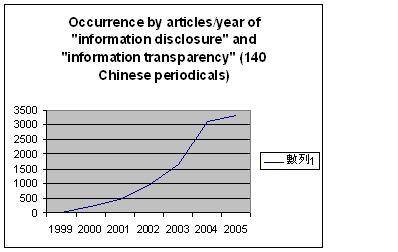As the end of 2006 approaches the likelihood of China taking action on the proposed Ordinance on Information Disclosure [Caijing’s Hu Shuli at FEER], entered in the State Council’s legislative calendar this year, unfortunately diminishes. But public access to information has become an issue of growing importance in recent years — not just to media, who increasingly see themselves as defender’s of the public’s right to know, but also to the ordinary citizens, who see it as an effective way of checking runaway corruption. This year the debate over China’s draft emergency management law and a row between Fujian provincial party officials and outside commercial media and the national Xinhua News Agency brought the issue of information disclosure into focus.
The following chart, using data obtained from the Wisenews database of mainland Chinese newspapers, shows the rapid rise of “information disclosure” and “information transparency” as terms of importance.

[NOTE: Search conducted for “information disclosure” or “information transparency”]
The terms were virtually missing in 1999, with the database showing only five articles for that year. In the first nine months of this year occurrence by article totaled 2,897, on track for a 16 percent increase over 2005.
Below is an October 12 editorial appearing in Western Economic Daily, a commercial paper in Lanzhou in China’s western Gansu province. It is a good example of how predominantly commercial media are approaching the issue of information disclosure and the public’s right to know. In this case the issues are environmental protection and official cover up:
Western Economic Daily
Lying Officials are Harmful to Government Honesty
By Lu Zeguan (staff editorial writer)
An inspection team for “cleaning up illegally polluting enterprises” comprising officials from seven State Council ministries including the State Environmental Protection Administration and the Development and Reform Commission … arrived at Guizhou’s Liupanshui City. Liupanshui’s vice-mayor, Ye Dachuan (叶大川) lied through his teeth to the inspection team.
That a government official lied through his teeth is not news. China Central Television’s “Focus” [an investigative news show started in the 1990s] regularly reveals cases in which plenty of officials face the camera and lie through their teeth, their eyes steady, their faces not flushing, their hearts not quickening … [Talks about case of Shaanxi official jailed 13 years for lottery-related corruption].
[Talks about corrupt behavior and lying among officials as basically rooted in poor morality] … Of course, in building up a knowledge and sense of honesty, of speaking the truth to the people, mere moral education is not enough. More important is the creation of institutions and guarantees.
Creation of a mature system can check the power of officials, ensuring they cannot cheat the people with lies. First of all, government information must be open and transparent. If there is not open and transparent information and all situations are locked in official safe boxes, well then, officials can completely lie to the people. It’s in the human character to be self-interested and think about benefit to oneself. When personal interest and reputation are involved, anyone might do what they can to protect their interests and reputation. If a government official’s hold on information is exclusive and the vast majority of people are kept in the dark, well then, in all probability they will choose the language most beneficial to themselves and avoid language that is disadvantageous. So disclosure of information is the precondition for putting an end to official lies.
Secondly, under this precondition of information transparency and the public’s right to know,
we must safeguard the right of the people to supervise [leaders]. The people should have the right to supervise and make inquiries of government bodies and the work of government officials by entrusting representatives to make inquiries before the People’s Congress, making petitions by letter and call, or through the mass media. While the people’s right to supervise power is guaranteed by the Constitution, there are no specific laws or regulations that make this actually happen. With open and transparent information and with people empowered to monitor government power, leaders who lie through their teeth will become laughingstocks before the people. Officials with government and social status will doubtless be more fearful when they open their mouths to speak …
[Posted by David Bandurski, October 16, 2006, 2:55pm]




















